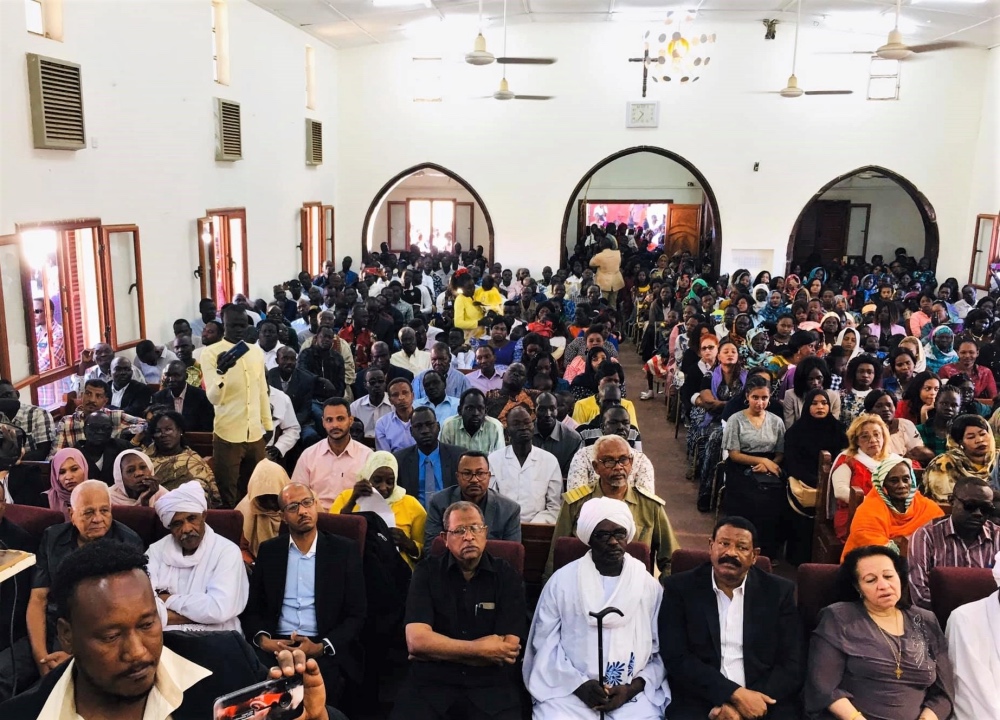Nairobi, Kenya
Morning Star News
In stark contrast to his predecessor, Sudan’s new minister of religious affairs last week attended a long-persecuted church’s Christmas service.
Following the Sudanese Government’s announcement of Christmas as a public holiday for the first time in eight years, Minister of Religious Affairs Nasr al-Din Mufreh accompanied senior government officials at the Christmas Day service of Khartoum Bahri Evangelical Church – a congregation the previous Islamist government had harassed for years.

Muslim government officials attend Christmas service at Khartoum Bahri Evangelical Church on 25th December. PICTURE: Facebook via Morning Star News
At a press conference after visiting several churches in Khartoum on Christmas Day, the Muslim leader sent a strong signal of religious coexistence to Christians in a country where they suffered for their faith under former President Omar al-Bashir.
“I tender my apology for the oppression and the harm inflicted on you physically, by [the prior government’s] destruction of your temples, the theft of your property and the unjust arrest and prosecution your servants and confiscation of church buildings,” Mufreh said, according to Radio Dabanga.
Sudan had suspended Christmas as a holiday following the secession of South Sudan in 2011. The government-run Sudan TV on Christmas Day broadcast Christmas services of various churches in Khartoum, including the Khartoum Bahri Evangelical Church, whose members had been subject to arrests on false charges and whose property had been threatened. The church is part of the Sudan Presbyterian Evangelical Church, which has been embroiled in property disputes, with the government appointing a government-run committee to assume control of the denomination.
In light of advances in religious freedom since Bashir was ousted in April, the US State Department announced on 20th December that Sudan had been removed from the list of Countries of Particular Concern that engage or tolerate “systematic, ongoing and egregious violations of religious freedom” and was upgraded to a watch list. Sudan had been designated a CPC by the US State Department since 1999.
Bashir, ousted by the army on 11th April after widespread protests began in December, 2018, was sentenced on 14th December to two years in a correctional facility for corruption and illegitimate possession of foreign currency. He still faces charges of plotting the 1989 coup that brought him to power.
Bashir has not yet been charged over the crackdown earlier this year that killed more than 250 protestors.
Among 11 people appointed to a Sovereignty Council to oversee the transition to civilian rule in Sudan is Raja Nicola Eissa Abdel-Masih, a Coptic Christian who long served as a judge in Sudan’s Ministry of Justice. She was one of six civilians appointed to the council on 21st August.
Amid these hopeful signs, Christians in Sudan are still awaiting the return of properties seized by the government under Bashir, who also has been indicted by the International Criminal Court for directing a campaign of mass killing, rape, and pillage against civilians in Darfur.
Following the secession of South Sudan in 2011, Bashir had vowed to adopt a stricter version of sharia (Islamic law) and recognise only Islamic culture and the Arabic language. Church leaders said Sudanese authorities have demolished or confiscated churches and limited Christian literature on the pretext that most Christians have left the country following South Sudan’s secession.
In April, 2013, the then-Sudanese Minister of Guidance and Endowments announced that no new licenses would be granted for building new churches in Sudan, citing a decrease in the South Sudanese population. Sudan since 2012 has expelled foreign Christians and bulldozed church buildings. Besides raiding Christian bookstores and arresting Christians, authorities threatened to kill South Sudanese Christians who did not leave or cooperate with them in their effort to find other Christians.
After Bashir was deposed, military leaders initially formed a military council to rule the country, but further demonstrations led them to accept a transitional government of civilians and military figures, with a predominantly civilian government to be democratically elected in three years.
Christians are expected to have greater voice under the new administration. In September pastor Mobarak Hamad, former head of the Sudanese Church Council, demanded that the transitional government return all church buildings, lands and properties wrongfully confiscated by the former regime.
Religious Affairs Minister Mufreh told Asharq Al-Awsat his ministry would fight terrorism, extremism and ‘takfiri’ notions – punishments for leaving Islam. Mufreh previously worked as a leader in the Al-Ansar Mosque in Rabak, south of Khartoum.
The new government that was sworn in on 8th September, led by Prime Minister Abdalla Hamdok, an economist, is tasked with governing during a transition period of 39 months. It faces the challenges of rooting out longstanding corruption and an Islamist “deep state” rooted in Bashir’s 30 years of power.
Hamad, the former chairman of the Sudan Council of Churches, has said that the government should recover all properties confiscated under the previous regime, including the Catholic Club and another building belonging to the Sudan Interior Church.
The Catholic Club, strategically located near the Khartoum International Airport, was turned into the headquarters of Bashir’s National Congress Party. The Sudan Interior Church building, used by the Khartoum International Church and other Christian organizations, was turned into offices for the notorious National Intelligence and Security Service.
On 29th July, Chairman of the Military Council Abdul Fattah Al-Burhan issued a decision to amend the name of NISS to General Intelligence Service. The measure also froze Article 50 of the Law of Security Service, which had given NISS broad powers of inspection and detention without cause, widely misused against Christians and political opponents.
Sudan fought a civil war with the south Sudanese from 1983 to 2005, and in June 2011, shortly before the secession of South Sudan the following month, the government began fighting a rebel group in the Nuba Mountains that has its roots in South Sudan.
Sudan ranked sixth on Christian support organization Open Doors’ 2019 World Watch List of countries where it is most difficult to be a Christian.






